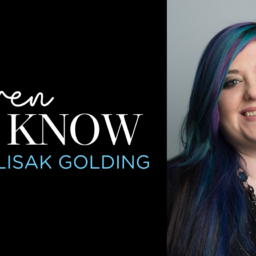
 Welcome to Indy Maven’s Enneagram column coming by way of Jenn Lisak Golding of Uncovered Gems. Check out her website for even more info from the world of Enneagram, or to book a private session.
Welcome to Indy Maven’s Enneagram column coming by way of Jenn Lisak Golding of Uncovered Gems. Check out her website for even more info from the world of Enneagram, or to book a private session.
I don’t know about you, but setting boundaries is HARD for me. Learning my Enneagram type helped me better understand why, but it doesn’t make the act of setting those boundaries any easier.
In my work as an Enneagram coach, I’ve noticed that a common challenge is setting boundaries. Some have no problems with setting them; it’s simply a matter of maintaining them, or it could be that others don’t communicate theirs. Some don’t even know where to start communicating theirs and are ultimately afraid of telling people they love and care about what’s bothering them. Regardless of your camp, there are effective ways to communicate your boundaries, maintain them, and encourage others to share theirs.
Let’s start with general best practices related to boundaries:
- A request is the act of asking for something. You can say no to the request as it’s an ask, not a demand. A boundary is something that helps identify what we’re comfortable with and what we’re not. It’s firmer than a request. In a good relationship, boundaries are respected. Boundaries being repeatedly crossed can create resentment and an unsafe environment, leading to conflict and strife.
- It is your own personal responsibility to communicate your own boundaries and listen to the boundaries of others. No one can read your mind; even if we can read uncomfortable body language, it still doesn’t tell us what you’re uncomfortable about. If you don’t tell, people won’t know.
- If you sense someone is uncomfortable or hesitant about something, it might be good to ask them kindly but directly. Example: “It seems like you might be hesitant to share a concern or boundary with me. I’m open to feedback and also want to respect your space as you respect mine. Is there anything I can do to ensure that happens?” If you come out and ask them, especially to those who are more uncomfortable with sharing them, it provides them with a safe space to share.
- We all have unique experiences and different reasons for boundaries, some of which might result from trauma. It’s important to be respectful and not necessarily pry into why the boundary was set. Also, even if a boundary seems odd to you, it might be highly personal to someone else. Don’t judge someone based on their boundaries.
That said, let’s talk about setting better boundaries for each type.
Type 1
The core motivation of Type 1 is to be good and avoid being at fault. This leads to perfectionism, leading to a lot of inner criticism. While they can be open to feedback, they’re not always in the space to hear it.
Type 1s: Get comfortable communicating when you’re not in a space to hear constructive criticism. Maybe set a time for when you are ready to have that conversation. Be firm yet kind. Also know that feedback is usually coming from a place of care. You are doing great things in this world; feedback doesn’t change that!
Type 2
Type 2s want more than anything to be loved, needed, and wanted in the world. That means that conflict can feel very abrasive to them. They might need time to process before confronting issues in a relationship as issues, for them, translate into not being liked or loved at that moment.
Type 2s: Even if it feels uncomfortable, it’s essential for you to communicate that you’re willing to have a conversation but want some time to process before talking through it. That’s a perfectly reasonable boundary, and asking for what you need is ok. People will likely respect you even more for asking!
Type 3
If you know a Type 3, you know how ambitious they can be when trying to meet their goals. They don’t want to be slowed down and can even get frustrated if they see other people as barriers. When working with them, it’s key to understand their drive and why it’s important to them.
Type 3s: For many, understanding your why is just as important as understanding your what. Tell people why your goals are important and how they can help set you up for success—especially when it comes to giving you time and space to work toward them. You can conquer the world; you just have to tell people what you need to get there!
Type 4
Type 4s want to be seen as unique and significant in this world. Part of being seen that way is through creative expression, and they need time and space to make it happen. Time limits or even deadlines can feel restricting to them.
Type 4s: It’s crucial for you to share with others what interrupts your state of creativity and even that you’re sensitive to the environment around you. Maybe even have a way to communicate when you’re in a creative state to avoid interruptions. You have so much creativity to offer the world, and we want to see it!
Type 5
Type 5s are exceptionally researched and overprepared in everything they do. That means that putting them on the spot or even pressuring them to engage can result in frustration and disengagement. Like Type 4s, they need time and space to finish their work and will let you know when they want to engage.
Type 5s: Be clear with your friends, family, and colleagues when you need to be left alone to do your best work or what you enjoy. Also, be clear that you’ll always speak up when something interests you, but being pressured to engage will not end well. You’re allowed to like what you like!
Type 6
As the guardians of the Enneagram, Type 6s expect that others will do as they say and say as they do. They value loyalty, reliability, and predictability; fluctuating can create distrust and a sense of unmet expectations for 6s.
Type 6s: Others may be able to shift gears more fluidly, which may feel jarring to you when you have settled plans. While it might seem like common sense to you, it’s good to let those around you know how important it is to you to maintain trust. Part of that is feeling supported by actions and words. You give so much support to others; it’s reasonable for you to expect that of them!
Type 7
Type 7s will avoid negative emotions at all costs. Pushing them too far can lead to an unexpected outburst of emotions or even a shutdown. They will not want to re-engage with you if they feel like they don’t have a safe space to avoid certain topics when they want to.
Type 7s: Part of the journey is getting through the tough times. While they may feel painful in the moment, they can lead to beautiful things. That being said, always feel comfortable letting others know you don’t want to talk about that right now and suggesting a better time to do so when you’re in the right headspace. It’s okay to focus on the positive, but not for the sake of your personal growth. You can do hard things!
Type 8
Type 8s want to be seen as strong and impactful. If they feel as though they are being manipulated or controlled in any way, they will feel resentful and even angry. They are very black and white when it comes to boundaries.
Type 8s: You have no problem communicating your needs, so I encourage you to tell those around you that when you’ve made it clear you’re not doing something, it won’t happen and not to push the issue. You may be open to other perspectives, but respect for boundaries is key. Use your strength to ask for what you need!
Type 9
Peace, harmony, and comfort are critical to Type 9s. That means that being pushed to do something, even if it’s something they might want to do, will not feel comfortable to them—especially if it’s an urgent request.
Type 9s: It’s okay if you need time and space to respond to a request, but others may want to know when you’ll have an answer. Give yourself and others a deadline for responding so you both know what to expect. It’s okay if you need time, and it’s definitely okay for you to protect your peace!
If you’re finding it hard to set or maintain boundaries, think about when others set boundaries with you. Does it bother you? Or do you do your best to respect them? If I had to guess, most people try to respect them and don’t see them as an issue. So why should you?
We can all do hard things—and we should. You’ve got this, Maven.
Jenn Lisak Golding is a certified Enneagram coach through The Art of Growth and the face behind Uncovered Gems. She is also the founder and owner of the sister brand Sapphire Strategy, a measured marketing agency. As a long-time fan of emotional intelligence, Jenn is passionate about helping individuals, teams, and leaders on their personal and professional growth journeys.
All of our content—including this article—is completely free. However, we’d love if you would please consider supporting our journalism with an Indy Maven Membership.





















